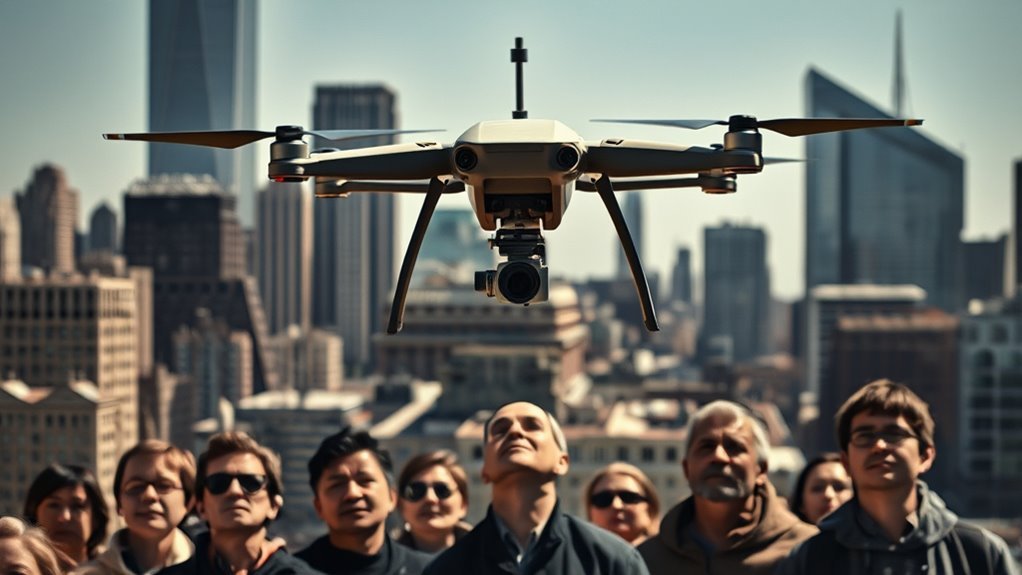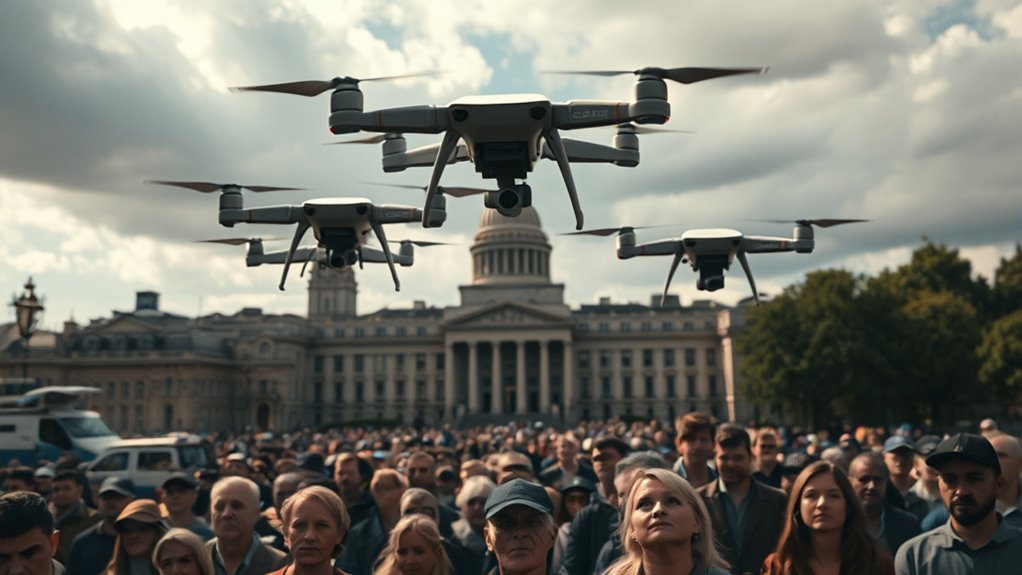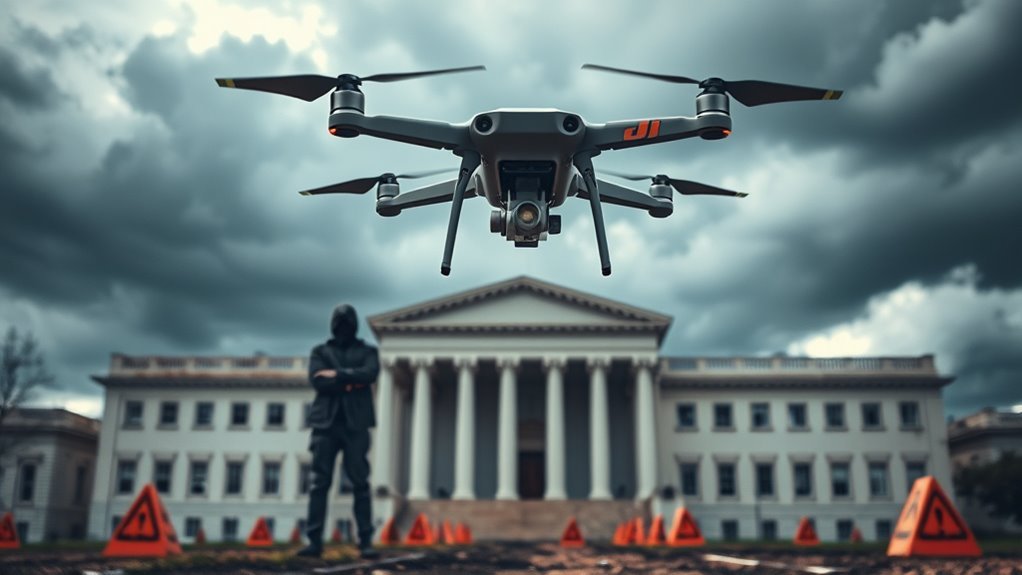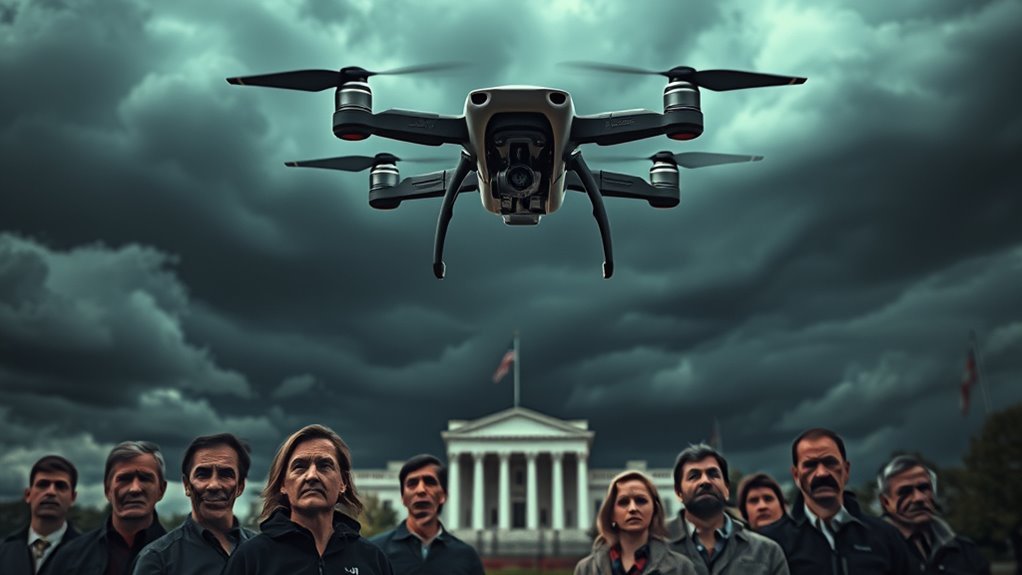You might be concerned about DJI drones facing a ban due to several factors. First, national security issues arise from potential foreign surveillance. Data privacy issues persist, as these drones collect extensive personal data. Regulatory compliance poses challenges with varying local laws and safety standards. Rising competition from local manufacturers increases pressure, while geopolitical tensions and public trust erosion complicate the landscape. If you consider these elements, you’ll understand the broader implications they hold.
National Security Concerns

As concerns about national security rise, the scrutiny surrounding DJI drones has intensified, particularly given their widespread use in sensitive environments. Your awareness of these drones’ surveillance capabilities is vital, as they can capture high-resolution imagery and data, raising alarms about potential foreign influence. The possibility that foreign entities might access this information through DJI’s technology creates a significant risk, especially when it comes to critical infrastructure and military operations. The increasing reliance on these drones for various applications necessitates a thorough examination of their implications on national security. As you consider the balance between technological advancement and safeguarding freedoms, it is important to weigh the benefits against the potential vulnerabilities posed by foreign-controlled devices in the skies above. Additionally, DJI’s advanced flight stability allows for efficient operations, which may further complicate oversight and regulatory measures. Furthermore, the collision avoidance systems employed by DJI may not provide the same level of reliability as those in competing drones, raising further concerns regarding safety in sensitive areas.
Data Privacy Issues

While the allure of cutting-edge technology often overshadows potential risks, the data privacy issues associated with DJI drones cannot be ignored. These drones are designed to collect extensive data, including flight paths and images, raising concerns about how this information is used. Without clear user consent, you might unknowingly share personal data with third parties, undermining your privacy rights. Additionally, ambiguity in data collection practices can lead to potential misuse or unauthorized access, putting your information at risk. As a user, it’s vital to understand these implications before operating a DJI drone, as the convenience offered by such technology shouldn’t come at the expense of your freedom and privacy. Awareness of these issues can help you make informed choices. Furthermore, predictive analytics can be employed to forecast potential threats arising from data misuse, enhancing your overall security.
Regulatory Compliance Challenges

Steering through the regulatory landscape for drone usage can be intimidating, particularly for DJI drone operators who face varying laws across jurisdictions. Compliance failures can lead to severe penalties, and understanding these regulatory hurdles is vital for maintaining operational freedom. Additionally, the potential US ban on DJI underscores the importance of global commerce dynamics in shaping regulatory compliance for drone manufacturers.
| Challenge | Impact on Operators | Potential Solutions |
|---|---|---|
| Varying Local Laws | Risk of fines or bans | Research local regulations |
| Airspace Restrictions | Limited flight areas | Obtain necessary permits |
| Privacy Regulations | Data handling scrutiny | Implement robust data policies |
| Safety Standards | Liability concerns | Regular safety training |
Navigating these challenges requires diligence and awareness, but overcoming them is essential for DJI operators who wish to enjoy their flying experience without the threat of regulatory repercussions. Additionally, compliance with NDAA standards is crucial for maintaining access to government contracts and market opportunities.
Rising Competition From Local Manufacturers
With the rapid advancement of drone technology, local manufacturers are increasingly emerging as formidable competitors to DJI. You might notice that these companies capitalize on local innovation and domestic manufacturing, offering products that cater specifically to regional needs. This shift could threaten DJI’s market dominance as consumers seek alternatives.
Consider these points:
- Enhanced customization options that reflect local preferences.
- Competitive pricing due to reduced shipping and import costs.
- Stronger support networks, fostering customer loyalty and trust.
- Increased agility in responding to market demands and regulatory changes. Additionally, local manufacturers may leverage AI integration to enhance their product offerings and operational efficiency.
As local manufacturers grow, they could reshape the landscape of the drone industry, forcing DJI to adapt or risk losing market share. The emergence of these competitors might very well influence DJI’s future considerably. Additionally, regulatory compliance becomes crucial as these companies navigate international markets, further challenging DJI’s position.
Geopolitical Tensions
Geopolitical tensions have increasingly influenced the drone market, particularly as international conflicts rise. You’ll notice that national security concerns often prompt governments to scrutinize foreign-made drones, including those from DJI. Additionally, trade restrictions can complicate access to these technologies, impacting both consumers and manufacturers alike. As a result, NDAA compliance has become a critical factor influencing the market landscape for drone technologies. Moreover, the emphasis on supply chain security in the NDAA has led to heightened scrutiny of foreign products, including drones, further complicating their market presence.
Rising International Conflicts
As international conflicts escalate, the implications for technology companies like DJI become increasingly significant. The rising geopolitical tensions can lead to a reevaluation of international alliances, which may impact the drone technology market. Countries may impose restrictions or outright bans on DJI drones, fearing potential surveillance or data security risks.
- Increased scrutiny on foreign technology companies
- Potential sanctions affecting trade relationships
- Heightened competition in the drone market
- Shift towards local alternatives in defense strategies
You need to recognize that these factors could hinder DJI’s operations and market presence globally. As nations focus on safeguarding their interests, the future of DJI drones could be jeopardized, prompting calls for stricter regulations and oversight.
National Security Concerns
While nations grapple with the implications of rising geopolitical tensions, national security concerns have increasingly come to the forefront of discussions surrounding DJI drones. The potential for military applications and espionage risks associated with these UAVs raises alarms among governments.
| Concern Type | Description | Potential Impact |
|---|---|---|
| Military Applications | Drones could be used for surveillance or tactical advantages | Heightened military tensions |
| Espionage Risks | Data collected may be exploited for intelligence gathering | Compromised national security |
| Regulatory Challenges | Difficulty in enforcing drone regulations internationally | Increased risks of misuse |
| Public Perception | Growing distrust in foreign technology | Calls for bans or restrictions |
As nations prioritize autonomy in their security frameworks, the future of DJI drones hangs in the balance.
Trade Restrictions Implications
Trade restrictions on DJI drones can considerably impact international relations, especially when countries seek to assert their technological independence. As tensions rise, the implications of these restrictions become more evident.
- Trade agreements impact bilateral relations, often leading to broader economic consequences.
- Economic sanctions effects can ripple through supply chains, affecting both consumers and industries.
- Countries may pursue alternative drone technologies, fostering domestic innovation.
- The geopolitical landscape may shift, with nations realigning partnerships based on technological capabilities.
As these dynamics unfold, it’s essential to assess how trade restrictions not only target companies like DJI but also shape global alliances and influence the pursuit of freedom in technology. The balance between security and innovation remains a pivotal consideration.
Safety and Liability Risks
When considering DJI drones, you should be aware of the increased collision risks they pose in crowded airspaces. Additionally, concerns about privacy invasion can arise, especially in urban areas where surveillance becomes a possibility. Finally, maneuvering the complicated landscape of regulatory compliance can lead to significant liability challenges for operators. Furthermore, operators must understand that federal laws protect drones, making it illegal to shoot them down and potentially leading to severe legal consequences. The challenges of signal penetration through various materials can complicate effective drone operations, especially in densely populated regions where unexpected obstacles may arise.
Collision Risks Increase
As drone usage continues to rise, the potential for collisions becomes a significant concern, heightening both safety and liability risks. With increased aerial traffic, effective airspace management policies are essential. However, challenges persist in ensuring that drone operators utilize advanced collision detection technology.
- Inadequate training for operators may lead to misjudgments.
- Limited awareness of surrounding airspace can increase risks.
- The absence of standardized protocols for drone operation complicates safety.
- Regulatory gaps might leave liability issues unresolved.
These factors contribute to an environment where collisions are more likely. Consequently, the potential for serious accidents raises questions about the future of drone usage and whether stricter measures will be enforced to mitigate these growing risks.
Privacy Invasion Concerns
While drone technology offers numerous benefits, it also raises significant privacy invasion concerns that can lead to safety and liability risks. You might not realize that these flying devices, often equipped with advanced surveillance technology, can inadvertently capture personal data without consent. This capability poses serious questions about how your information is collected, stored, and potentially misused. Imagine a drone hovering nearby, recording your daily activities or private conversations; it’s unsettling. Furthermore, the lack of clear regulations around drone use exacerbates these issues, leaving individuals vulnerable to unwanted scrutiny. As drones become more prevalent, it’s essential to evaluate the balance between technological advancement and the right to privacy, ensuring that your freedom isn’t compromised by invasive surveillance practices.
Regulatory Compliance Challenges
Although drone technology continues to advance rapidly, maneuvering through the regulatory landscape remains a significant challenge for operators. Many face substantial regulatory hurdles that can complicate their operations and lead to increased compliance costs. These issues can restrict your ability to utilize drones freely, impacting both personal and commercial endeavors.
- Lack of standardized regulations across regions
- Complex certification processes that delay deployment
- Heightened scrutiny leading to increased liability concerns
- Financial burdens related to compliance and permits
Navigating these challenges is vital for maintaining operational freedom. As regulations evolve, staying informed and adaptable will be key to ensuring you can leverage drone technology without facing unnecessary restrictions or penalties.
Public Perception and Trust Issues
Trust is a crucial element in the relationship between consumers and technology, and DJI drones have faced significant challenges in this regard. Brand perception heavily influences consumer trust, and recent concerns about data security and privacy have tarnished DJI’s reputation. Users often question how their data is handled, fearing potential surveillance or misuse. This skepticism doesn’t just stem from isolated incidents; it reflects broader geopolitical tensions and regulatory scrutiny surrounding Chinese technology firms. As you weigh your options, consider how these factors affect your confidence in DJI products. If consumer trust continues to erode, the backlash could lead to a ban, ultimately limiting your freedom to operate these versatile flying machines without apprehension. Additionally, concerns about advanced safety standards can further exacerbate the public’s unease regarding the reliability of DJI’s technology. Furthermore, DJI’s global presence may also intensify scrutiny as authorities seek to regulate foreign tech firms operating within their jurisdictions.
Frequently Asked Questions
How Do DJI Drones Compare to Competitors in Terms of Technology?
When it comes to drone technology, DJI’s innovations often set the bar high. In competitor analysis, you’ll find rivals struggle to match features like camera quality and flight stability, making DJI the go-to choice for enthusiasts.
What Are the Potential Legal Consequences for Using Banned Drones?
Using banned drones can lead to serious legal ramifications, including fines and potential criminal charges. Staying updated on drone regulations is essential for ensuring compliance, protecting your freedom, and avoiding penalties associated with unauthorized drone usage.
How Can Consumers Safely Purchase Drones Amid a Potential Ban?
When it comes to safe purchasing, keep your ear to the ground. Consumer awareness is key; research regulations, buy from reputable sellers, and stay informed about drone models to guarantee you’re making wise choices.
What Alternatives Exist for DJI Drones in the Market?
When exploring alternative drone options, consider emerging drone brands like Skydio, Autel, and Parrot. Each offers unique features and capabilities, ensuring you find a suitable replacement that meets your specific needs and preferences.
Will a Ban Affect Dji’s Global Business Strategy?
A ban could greatly affect DJI’s global business strategy, forcing you to contemplate business adaptability. Without access to key markets, exploring alternative strategies becomes essential to maintain competitiveness and meet evolving consumer demands worldwide.

